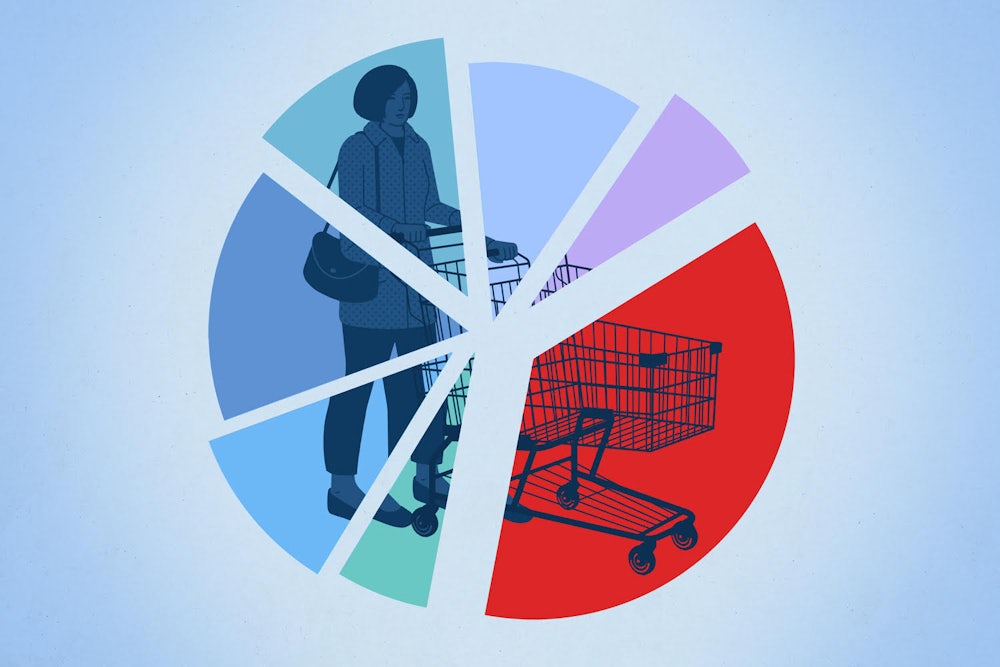It was only by visiting a state that didn’t tax groceries that Presdelane Harris realized her home was an outlier. Born and raised in Montgomery, Alabama, Harris remembers visiting her aunt in Maryland as a child, decades ago now, and accompanying the adults to the grocery store. Asking her mom for a treat, she was surprised the price of her snack at the cash register was the same as on the label. She didn’t know why, but the reason was simple: Maryland doesn’t charge sales tax on food. There are places in the world that don’t tax necessities, she realized.
Alabama is one of the poorest states in the country. A seemingly small 4 percent tax adds up, totaling at least two weeks of groceries costs over the course of a year. Thanks to the country’s current spate of sky-high inflation, Americans are paying 10.8 percent more for groceries than in April 2021. That burden has been harder, though, for people in the 13 states that still tax groceries. Many do so at a lower rate than general sales taxes or provide a credit come tax time to help lower-income families offset the cost. But three states—Alabama, Mississippi, and South Dakota—fully tax groceries at the same rate as other goods and services.
A grocery sales tax is a flat tax: Everyone pays the same rate. But low-income people spend a larger percentage of their incomes on food: In 2020, households in the bottom income quintile spent more than a quarter of their incomes on food and groceries, while those in the highest income quintile spent 7 percent.
Meanwhile, most states that still have grocery taxes also have written tax codes that skew toward those at the top—a dynamic that has only gotten worse since the onset of the pandemic. Mississippi, with its 7 percent grocery tax, passed a massive income tax cut earlier this year—the first step in the state Republican Party’s pursuit of repealing the income tax entirely. Thanks to post-Covid budget surpluses, many other states run by Republicans are also accelerating tax cuts for the wealthy. GOP-controlled states are busy replicating Sam Brownback’s disaster in Kansas, while handing a bigger tax burden to the poor and leaving grocery taxes untouched.
In Alabama, untaxing groceries is a popular idea, and not merely in the grocery aisle. Both Republican and Democratic lawmakers regularly sponsor bills to repeal the tax. Four such bills appeared this year, and at least three of the Republicans who unsuccessfully attempted to primary Alabama Governor Kay Ivey in May actively campaigned on grocery tax elimination.
Presdelane Harris is now the organizing director at Alabama Arise, a statewide advocacy coalition that has worked since 1999 on a campaign to “untax groceries” in Alabama. Tax reform can be dull and confusing work. But “everyone understands groceries,” said Harris.
Far too many Alabamians understand how hard it can be to keep food on the table. According to the U.S. Department of Agriculture, roughly one in seven households in Alabama struggled with hunger before the pandemic, compared to one in 10 nationwide. A 2021 study published in Food Policy found that grocery taxes are associated with higher rates of food insecurity. Recent research has indicated that grocery taxes are even linked to higher county-level rates of obesity and diabetes.
In March, Alabama Arise hosted an advocacy day at the State House where dozens of people held signs, thrilled about the first advocacy day in two years since the pandemic’s onset. They heard from both Republican and Democratic lawmakers supportive of finally eliminating Alabama’s state grocery tax. Unsurprisingly, the Alabama Grocers Association and big retailers such as Walmart also want shoppers to have more money in their pockets (to buy more groceries).
Yet the proposed law to untax groceries didn’t pass. The problem? A tax cut, no matter how progressive, is still a cut into state revenue.
Most states that tax groceries use the revenue for general spending, but Alabama designates the bulk of the receipts for the state’s education trust fund. Repealing the grocery tax would cut the education budget by almost $500 million. And Alabama already ranks toward the bottom in public education spending.
“The states that depend on grocery taxes generate a good amount of money for their state budgets [through] those taxes,” said Eric Figueroa, a senior manager at the Center on Budget and Policy Priorities. “A simple elimination without thought of how to replace that funding can put states in tough situations,” he said, noting that states could face later public service cuts in order to make up the difference.
Alabama has not been able to repeal the grocery tax because there’s no agreement about how to replace the revenue that funds education. Tax increases, after all, are anathema to most Alabama politicians. “If we were simply trying to take the tax off of groceries, I think it’d pass in a heartbeat,” said Carol Gundlach, a policy analyst at Alabama Arise.
Legislators may argue that because the state needs to balance the budget, advocates have a choice: get rid of the grocery tax or keep the education budget intact. Republican state Senator Tom Butler told Huntsville’s WAAY-TV that he and others “absolutely” want to see the grocery sales tax gone, but because of the funding issue, “You’re in a danged if you do, danged if you don’t situation.”
But Alabama’s regressive tax system doesn’t just show up in the sales tax on groceries. The state provides a 100 percent federal income tax (FIT) deduction on state taxes; Alabama taxpayers who choose to itemize deductions (generally the rich) can subtract the federal income tax they owe from their state tax bill. Only one other state, Iowa, allows this—but Iowa’s deduction is set to be repealed next year. In 2020, according to analysis from the Institute on Taxation and Economic Policy, Alabama lost a stunning $782 million in revenue due to this deduction. And the vast majority of that benefit—84 percent—went to households in the upper quintile, with an average income of $228,000.
Advocates at Alabama Arise have pushed a cap on the FIT deduction as the way to raise the revenue needed to repeal the grocery tax. But it’s generally been difficult to sway conservatives to support any tax increase. Still, Gundlach said, this past session was the closest the campaign had gotten in more than a decade, thanks to Republican sponsors on bills to get rid of the grocery tax and cap the FIT deduction. State Senator Andrew Jones, a Republican who sponsored the Senate bill, told me capping the FIT deduction is the “perfect revenue strain” to replace the grocery tax, because then the state isn’t finding the revenue by “penalizing low-income earners.”
“I’m interested in less taxes for our taxpaying citizens,” said Republican Representative Mike Holmes, who sponsored a similar version in the state House. And while he’d prefer to just ditch the grocery tax without touching FIT (“you’re not really doing a tax cut then, you’re just shuffling money around”), he wanted to finally get grocery tax repeal across the finish line. “We had the support,” Holmes told me, “we had the votes.” But he said that legislative leadership was never supportive of grocery tax repeal, and the bills never made it out of committee. Still, the untaxing groceries campaign has certainly come a long way since 2009, when the House presented the grocery tax repeal bill with the “Shroud Award,” a jokey annual tradition recognizing the “deadest” bill of the session.
“I think everyone realizes that we have to do something,” said Jones. “I don’t know if [my bill] will be the solution,” but ultimately, he said, “I am confident whether it’s in one or 10 years, we’ll be able to repeal.” After all, 59 percent of Alabamians, including 56 percent of Republicans, support repealing the grocery tax and replacing the revenue with higher taxes on the wealthy, according to a poll commissioned by Alabama Arise.
Due largely to the swell of federal pandemic aid and stimulus measures, many states have found themselves with large budget surpluses. Rather than looking to shore up public services or infrastructure, more than a dozen states have chosen to pursue tax cuts that would largely benefit the wealthy. (Congress barred states from using pandemic funds for tax cuts, but a federal judge blocked enforcement of the rule last fall.)
Mississippi, one of the three states that still tax groceries at the full sales tax rate, passed the state’s largest-ever income tax cut in March. Part of the original proposal paired the income changes with cutting the grocery tax—combining a regressive tax cut with a progressive one. But that grocery provision was stripped out of the bill that ultimately passed.
Kyra Roby, a policy analyst at Mississippi-based One Voice, noted that some Democratic lawmakers didn’t support cutting the income tax but initially voted for the proposal because it would’ve eliminated the grocery tax. “We felt that [grocery tax elimination] was a tactic to get votes” for the income tax reduction, she said.
Mississippi is the poorest state in the United States. Rural hospitals struggle to stay open, public schools are consistently underfunded, and welfare money goes to Brett Favre instead of poor families. The extreme cut to the income tax will further reduce revenue for these public services. The new income tax cut will cost the state $524 million in lost revenue annually when fully implemented in 2026.
Other states were also inspired by the combination of long-held ideology and new budget surpluses to slash taxes. Instead of the grocery tax, Alabama repealed a tax that had been required for businesses to register in the state. Oklahoma failed to pass legislation to suspend or cut its grocery tax, but the state did pass $700 million in incentives for a company, likely Panasonic, to build a plant. Idaho passed a $600 million income tax cut, while it added just $20 to its grocery tax refund credit.
We’ve seen this film before: States begin to recover after a recession and decide to use their boost in funds on regressive tax cuts. Kansas infamously brought in Reaganomics guru Art Laffer to push a sharp cut on income taxes in 2012, touting trickle-down ideology—only for Kansas to reverse course in 2017, after state revenue and economic growth plummeted. (This year, Kansas passed a law to phase out its grocery tax over the next three years.) But in lean years of lost revenue, the state had to slash spending on social services.
Something similar to the “Kansas Experiment” of lost public services and decreased school funding could happen to these states that have cut revenue by hundreds of millions of dollars—but what are the chances of Mississippi ever reversing a tax cut? “It’s going to be nearly impossible to get that money back,” said Kamolika Das, a state policy analyst at the Institute on Taxation and Economic Policy, noting Mississippi’s Republican supermajority. She adds that too many states are “making long-term, permanent cuts based on temporary surpluses.”




